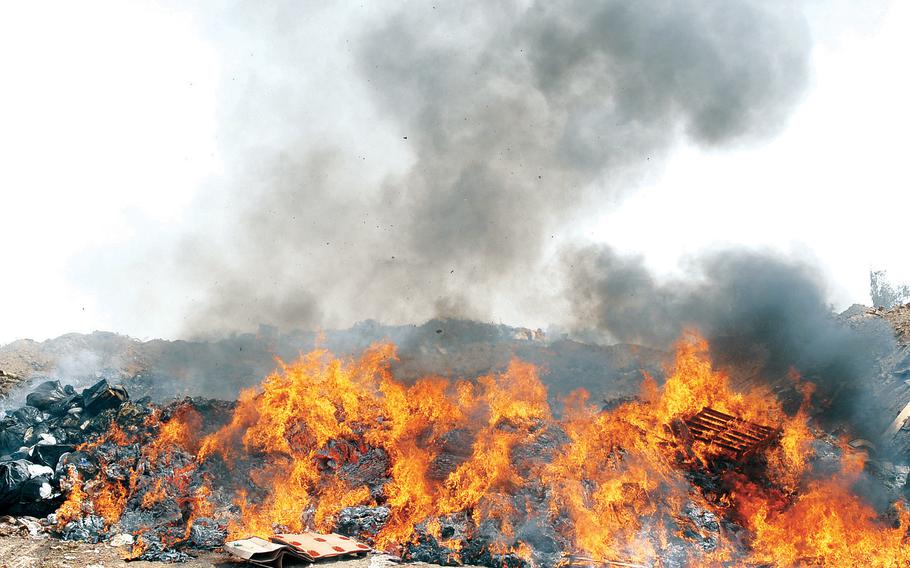
The burn pit at Balad Air Base, Iraq, in 2008. Long deployments to military bases with open-air burn pits put veterans of the wars in Iraq and Afghanistan at higher risk for certain respiratory ailments. (Stars and Stripes)
Memorial Day is more than a three-day weekend and the official start of summer. It’s the time each year when America pauses to remember its fallen soldiers, honor their legacy, and take care of those still carrying the wounds of war.
Unfortunately, this year Memorial Day coincides with a challenging series of events from the Department of Veterans Affairs, the federal agency charged with providing health benefits to eligible military veterans.
Consider headlines from the last few weeks. Allegations of improper bonuses totaling $11 million dollars to senior executives. More than 10,000 overlooked claims for leukemia and other diseases related to herbicide exposure. “Atomic veterans” — those who worked on nuclear weapons tests — at risk of losing federal benefits intended to compensate for the long-term health effects of their work.
Against this backdrop, the VA continues implementing the landmark Honoring our Promise to Address Comprehensive Toxics Act of 2022 — also known as the PACT Act. Passed with bipartisan support and signed by President Joe Biden, the PACT Act was a lifeline for veterans like me who served in war zones after 9/11 only to experience mysterious and debilitating breathing issues upon returning home.
It sounds strange to many in America with our modern conveniences, but in war zones, burn pits were a common way for the military to destroy trash, metals and chemical goods. The process creates smoke that all within proximity have no choice but to inhale. During my deployment in the early 2000s, the smell was constant and inescapable.
When I got home, I started experiencing breathing issues. Before long, I couldn’t walk up a flight of stairs without losing breath.
When I first started going to the VA, doctors told me it was related to anxiety. They even tried to put me on antipsychotic medications. Eventually, I demanded and underwent a surgical lung biopsy that revealed something called constrictive bronchiolitis, a rare respiratory disease of the small airways, resulting in decreased lung function. The biopsy was painful, but it got me the answer I was seeking.
Prior to PACT, veterans had to prove the link between their exposure to burn pits or other airborne hazards and their medical conditions. Thanks to PACT, not only is that burden of proof gone, but 23 presumptive conditions, including constrictive bronchiolitis, from burn pits and other toxic exposures are now covered under VA policies.
The influx of new patients eligible for care put new demands on the VA. To their credit, they have stepped up. The health care arm of the VA increased its workforce by 5.5% in 2023. During congressional testimony last month, VA Secretary Denis McDonough said that 1.3 million PACT Act claims had been filed thus far, with the average days to completion 17 days faster than a year ago.
This progress is positive, yet there is always more to do. Of the more than 2.5 million post-9/11 military veterans, more than 2 million served in Afghanistan and Iraq.
Fortunately, there are new and emerging Food and Drug Administration-approved technologies that can help veterans get answers faster, including some that specialize in functional lung imaging. Unlike the biopsy, a lung scan is non-invasive and painless. Scared veterans struggling to breathe and seeking answers should not be forced to endure complicated surgery, hospital stays and protracted recovery times. With its precision and sensitivity, this technology is more efficient at detecting early small airways pathology.
The VA should implement a pilot program using this technology at a small selection of its hospitals to demonstrate the effectiveness in triaging veterans and helping those most at need get prioritized for specialty pulmonary care. Doing so can establish a streamlined process to provide a lung scan to veterans presenting with shortness of breath at intake and accelerate their treatment.
Just as there were starts and stops during PACT’s legislative process, so too will there be in its implementation. Nothing good comes easily, and it takes everyone working together to make meaningful progress.
This Memorial Day, remember that just because the PACT Act has faded from the headlines doesn’t mean those depending on its success have suddenly gotten better.
So by all means, lay wreaths at cemeteries to honor those no longer with us. But then also do your part and urge the VA to get the PACT Act right. Veterans are counting on the country they took up arms to defend to have their back.
Cynthia Daniels served as a military police officer in the Missouri National Guard from 2000-2006 and was deployed to Kuwait and Iraq. She lives in Livingston, Mont., with her family.